Dietary Supplements: structure-function and implied disease claims
- Email This
- Trackbacks
- Share Link
Dietary supplements that make claims to "treat disease" suddenly become classified as drugs.
The FDA has issued a regulation entitled Certain Types of Statements for Dietary Supplements, which describes the types of claims that can and can not be made for dietary supplements. This regulation attempts to separate prohibited, "disease claims" (those which claim that the product will diagnose, mitigate, treat, cure, or prevent disease) from permissible "structure-function" claims.
To summarize relevant parts of this long and complication regulation:
• "disease" "refers to damage to an organ part, structure, or system of the body such that it does not function preoperly (e.g., cardiovascular disease), or a state of health leading to such dysfunctioning;"
• Disease claims can be not only express (e.g., made as statements or claims on the label), but also implied by the name of a product (for example, "herbal Prozac" and "antiobiotic").
Further, in determining whether an express or implied disease claim has been made, the FDA will look at whether statement claims that the product:
(1) Has an effect on a specific disease or class of diseases; (2) has an effect, using scientific or lay terminology, on one or more signs or symptoms that are recognizable to health care professionals or consumers as being characteristic of a specific disease or of a number of different specific diseases; (3) has an effect on a consequence of a natural state that presents a characteristic set of signs or symptoms recognizable to health care professionals or consumers as constituting an abnormality of the body; (4) has an effect on disease through one or more of the following factors: (a) The name of the product; (b) a statement about the formulation of the product, including a claim that the product contains an ingredient that has been regulated by FDA as a drug and is well known to consumers for its use in preventing or treating a disease; (c) citation of a publication or reference, if the citation refers to a disease use; (d) use of the term ``disease'' or ``diseased;'' or (e) use of pictures, vignettes, symbols, or other means; (5) belongs to a class of products that is intended to diagnose, mitigate, treat, cure, or prevent a disease; (6) is a substitute for a product that is a therapy for a disease; (7) augments a particular therapy or drug action; (8) has a role in the body's response to a disease or to a vector of disease; (9) treats, prevents, or mitigates adverse events associated with a therapy for a disease and manifested by a characteristic set of signs or symptoms; or (10) otherwise suggests an effect on a disease or diseases.
Our law office represents companies who need legal assistance with their dietary supplement or cosmetic labels and labeling. We also handle medical device and other FDA issues. The regulatory distinctions are sometimes very subtle and one has to know where to look for answers.
Law Offices of Michael H. Cohen today.
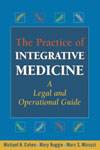 The Practice of Integrative Medicine: A Legal and Operational Guide is now available from Springer.
The Practice of Integrative Medicine: A Legal and Operational Guide is now available from Springer.
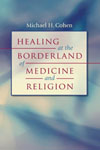 One of the transformations facing health care in the twenty-first century is the safe, effective, and appropriate integration of
One of the transformations facing health care in the twenty-first century is the safe, effective, and appropriate integration of
 Michael H. Cohen's novel A Question of Time is about consciousness. Gabriel Goodman takes a vacation from his law firm
Michael H. Cohen's novel A Question of Time is about consciousness. Gabriel Goodman takes a vacation from his law firm
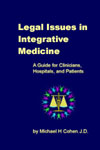 Legal Issues in Integrative Medicine: A Guide for Clinicians, Hosptials, and Patients by Michael H. Cohen (National Acupuncture Foundation,
Legal Issues in Integrative Medicine: A Guide for Clinicians, Hosptials, and Patients by Michael H. Cohen (National Acupuncture Foundation,
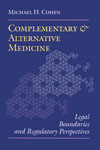 In Complementary and Alternative Medicine: Legal Boundaries and Regulatory Perspectives, Michael H. Cohen breaks new ground in putting together the
In Complementary and Alternative Medicine: Legal Boundaries and Regulatory Perspectives, Michael H. Cohen breaks new ground in putting together the
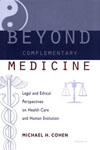 In Beyond Complementary Medicine, Michael H. Cohen goes deeper into the legal, ethical, and regulatory aspects of integrating complementary and
In Beyond Complementary Medicine, Michael H. Cohen goes deeper into the legal, ethical, and regulatory aspects of integrating complementary and
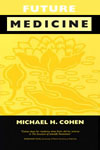 Future Medicine by Michael H. Cohen is an investigation into the clinical, legal, ethical, and regulatory changes occurring in our
Future Medicine by Michael H. Cohen is an investigation into the clinical, legal, ethical, and regulatory changes occurring in our
 What happens when a Wall Street lawyer, steeped in Judaism, enters an interfaith seminary, engages mystically, and connects with disincarnate
What happens when a Wall Street lawyer, steeped in Judaism, enters an interfaith seminary, engages mystically, and connects with disincarnate